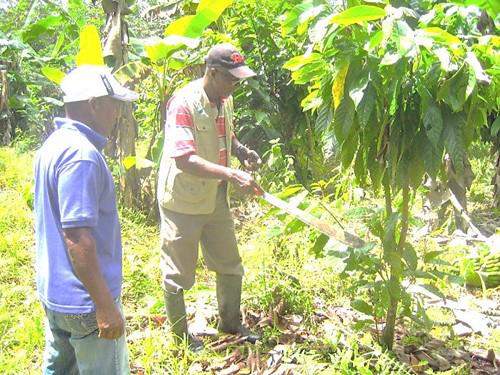
Worth the Wait: Cocoa Production Leads to a Living Wage
The Colombia-Chocó program supports farmers in growing cacao, or cocoa, for the international chocolate market, in remote rural communities which have faced complex challenges to their food security. In this region along the Pacific coast, communities are accessible only by river, and there are few possibilities for economic advancement. Farming has been complicated by flooding, the presence of armed groups and pressure to grow illicit crops.
Cacao production is seen as an opportunity for employment and increased income and an economically viable alternative to growing illicit crops. Farmers like Simón began cultivating cacao four years ago. With technical assistance, supplies and training, Simón has learned how to maintain, prune, and graft the cacao trees. In addition to caring for his own farm with his wife, Simón works as a local assistant to monitor and support other area farmers. “I visit other cacao farms, and I record what’s good and what’s lacking. With what I know, I advise the other farmers, and I invite them to visit my farm as well.”
Cacao requires at least two years of care to begin producing fruit, and up to five years to reach its maximum levels. With the hard work that he and his wife have invested in their farm, they had their first significant harvest of the fruit this season. Some of the more successful farmers are already selling their crops at market and receiving living wages.
“I believe I can get ahead by cultivating cacao,” said Simón. “My wife and I are grateful, and I know that others are, too.”
Led by Mennonite Central Committee, local partner Mennonite Brethren Regional Council Colombia, and its offshoot FAGROTES (Fundación Agropecuaria Tejiendo Esperanza , or Weaving Hope Agricultural Foundation)
